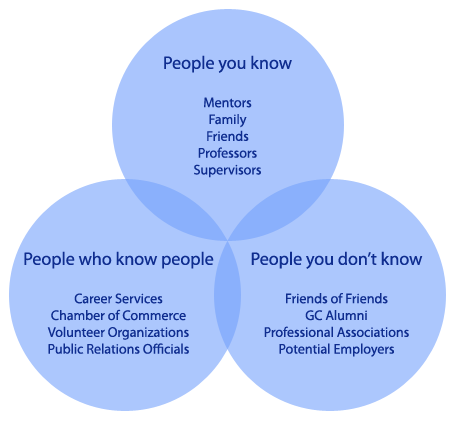
After preparing your professional documents like the résumé and cover letter, identify the names of organizations to which you could apply. Remember that finding a job can be a job itself. On average, it takes several months to find an appropriate position, so start early.
Strategies for developing leads
The following advice adapted from WorkSource can help you get started.
Network!
Think of the people you know – relatives, friends, professors, classmates, co-workers at summer jobs, and others. Make more of an effort to meet with people, and use these conversations to ask their advice, to make them aware of your job search, to learn more about their jobs or their organizations, and to get the names of others who might be useful in your job search. This is by far the most effective way to find employment.
Networking with GC alumni
Goshen College alumni are an excellent source of information and you are guaranteed to have at least one thing in common: GC. This connection creates a collegial atmosphere in which to interview and therefore may be a more informative opportunity.
- GC Maple Leafs- LinkedIn Alumni Group
A GC networking group is available through LinkedIn, a professional online networking site. To join, create a profile and join the GC Maple Leafs Alumni Group. Be sure to watch the brief, informative LinkedIn video for students before joining.
- Online Alumni Directory
Goshen College’s Online Alumni Directory is exclusively for GC alumni (and students) to search for contact information of fellow alumni. After you have registered, review this instruction sheet for contacting GC alumni via the Online Alumni Directory.
Target your résumé
Make sure your résumé is targeted to employers and is professionally written. Create more than one résumé if you are applying to more than one industry.
Create a contact database
Write down all the employers you contact, the date you sent your résumé, people you talked to, and notes about those contacts. Keep a note pad with you at all times and take notes as soon as you hear about an opportunity or when you leave an interview. Get into the habit of updating your database daily. (Savvyy™ offers tools for maintaining such a database and much more.)
Try the buddy system
Link up with a friend who is also job hunting. Arrange to speak weekly and report on accomplishments, best practices, and future plans.
Learn how to talk about yourself
Throughout your job search, you will speak with many people at different levels. You must be comfortable having conversations about yourself with other people. Keep in mind that you never know who may end up being useful to your job hunt.
Prepare an elevator speech
You never know who you’ll meet in an elevator, in line at the coffee shop, or on the street. Know your skills and how to communicate them. You should be able to tell prospective employers and others you meet what you can offer. You should also be able to talk about how your skills relate to the industries that interest you.
Research employers in your field
Remain current on any issues or developments in the field. Read trade journals, professional publications, and the newspaper. It is extremely impressive during an interview if you know about the latest news in the industry.
Practice for each interview
Preparation is key to interviewing well. Friends, relatives, professors, and the Career Services office can help you formulate strong answers to questions you might not anticipate.
Stay confident
Job hunting takes time and energy. Remain confident, but prepare yourself for challenges ahead. Don’t get discouraged if you are still looking for a job and it seems like everyone you know has an offer. Most students find their jobs after graduation, and even experienced job seekers often search for months before finding the right opportunity.
Additional suggestions:
- Join a professional/trade organization as a student member; attend conferences
- Talk to professionals in the field for information and potential job leads
- Look online at job banks and employer web sites
- Directly contact organizations you are interested in working for via e-mail, postal mail, or phone
- Volunteer in the industry you would like to work for
- Visit with employers at career fairs
- Consider a post-graduate internship
- Look through professional journals and newspaper classified ads
- Meet with a representative at a temporary employment agency to tide you over
What is networking?
Networking is simply talking with people for information and advice regarding career opportunities. It is not asking for a job yet the information gained may lead to unadvertised positions. Some surveys estimate that up to 70-80% of all jobs are secured by talking to people. Networking can include the following activities:
- Contacting those people you already know
- Asking contacts about their work (what they like best, what they like least) and if they are aware of available positions
- Asking contacts if they know of other persons who might be willing to talk with you
- Being able to convey the skills and abilities that would make you a good employee
- Keeping the network going – the least that happens is that you learn about potential jobs, and the best result could be that someone decides you are a good fit for their organization
The following people may be appropriate to include in your network. Many will be able to provide you with additional names of specific individuals to contact.

Networking web resources

LinkedIn.com

A professional online networking site with more than 13 million experienced professionals from around the world, representing 150 industries. Be sure to watch the brief LinkedIn video for students before joining.
Networking Cards
Like business cards, but they contain info about positions you are seeking, rather than the position you already hold. Use our templates or design your own!

Savvyy™
Helps you stay on top of your job search by helping you organize better. Savvyy™ replaces your address book, to-do list, and numerous spreadsheets with one easy to use interface. It’s free, secure, and fully integrated with GC Online.

Young Professionals Network – Greater South Bend/Mishawaka chapter
If you’re staying in the area, consider attending YPN events to build your network and engage in professional development. (If you’re not staying in the area, search online for a YPN chapter near you.)

Networking Your Way to a New Job
An article on networking, including ways to network successfully.

Weddle’s Association Directory
Professional associations and societies often operate Web-sites featuring job boards or other employment-related services (these can include job agents and discussion forums for networking). This Directory is specially designed to help you find those association sites.




